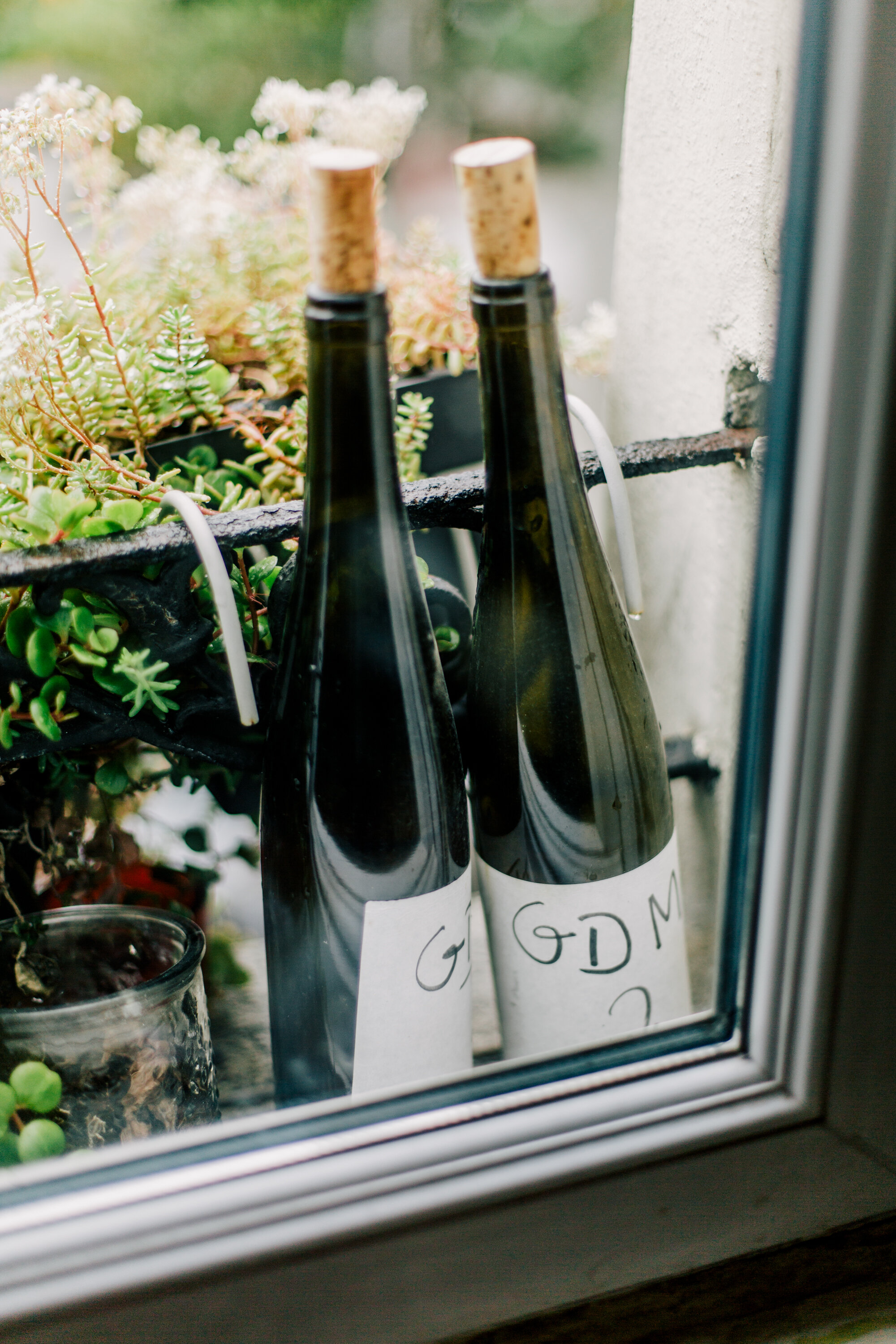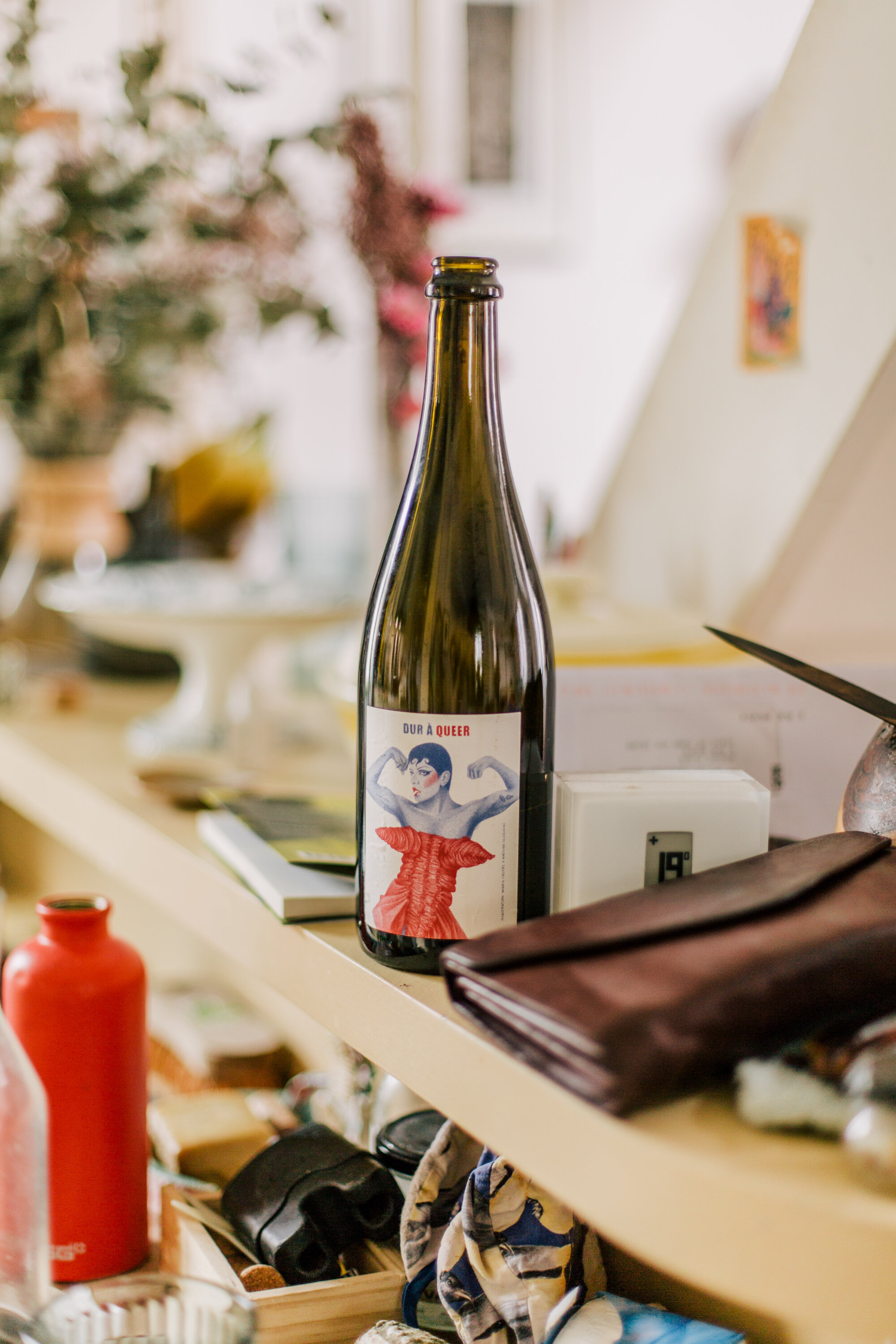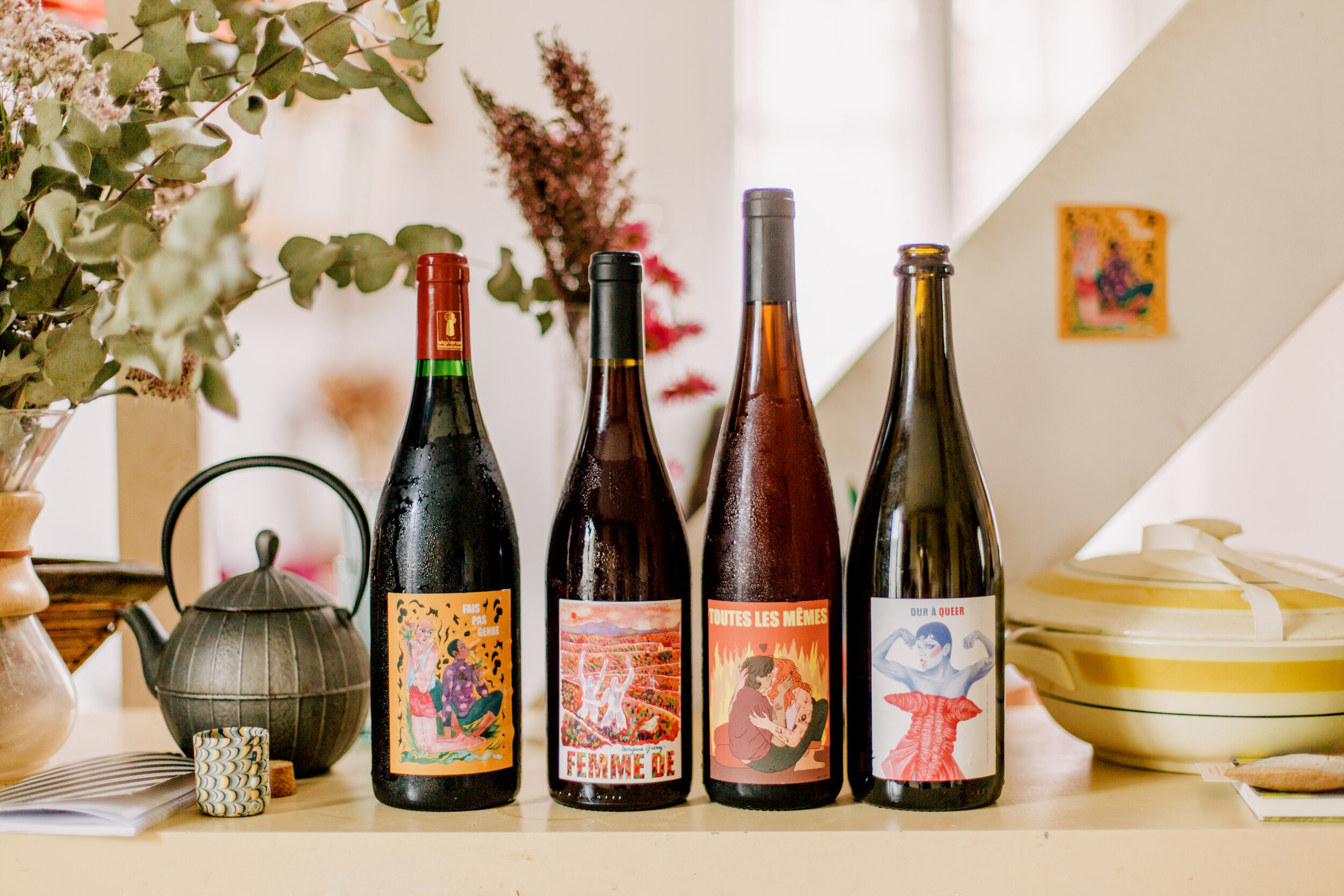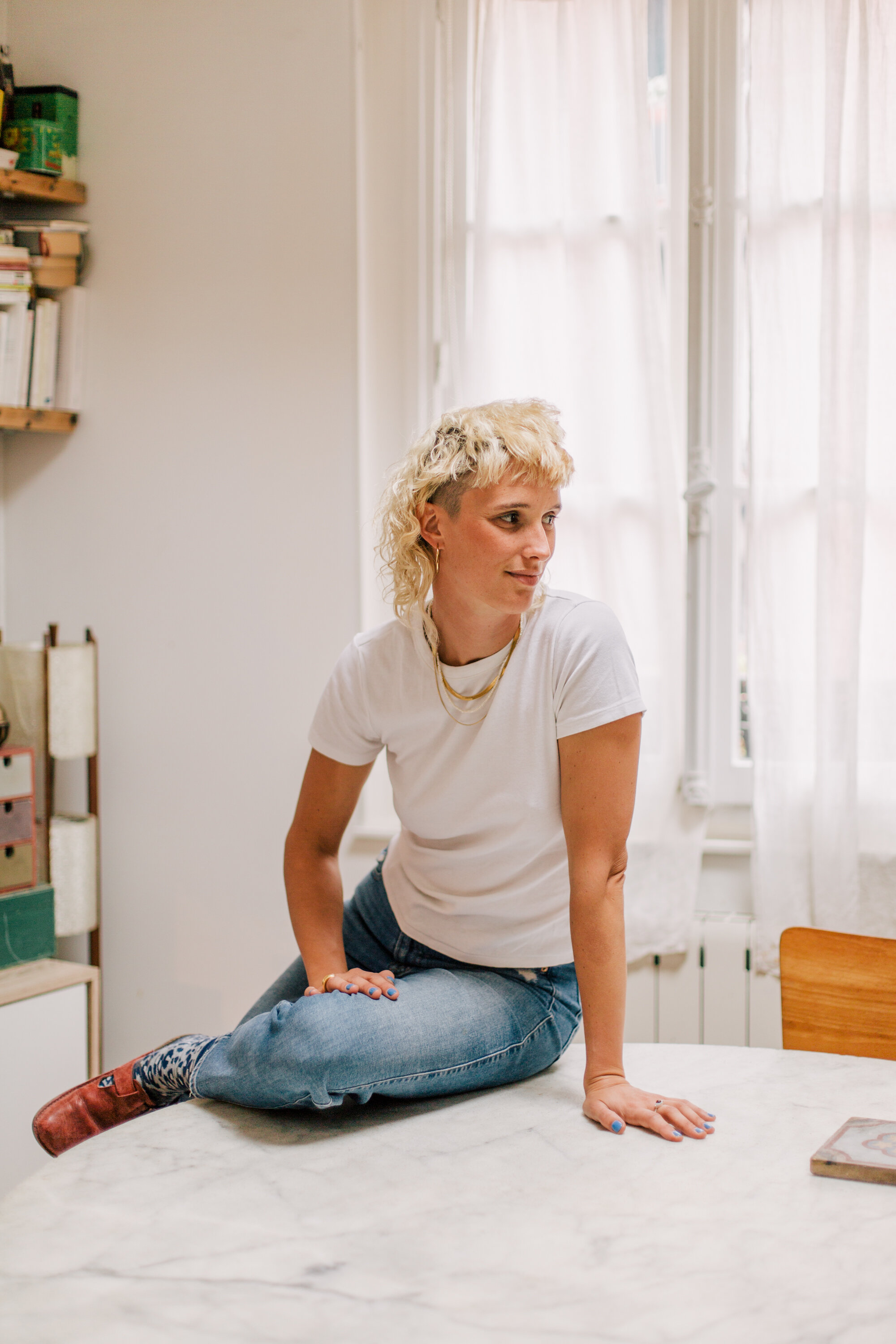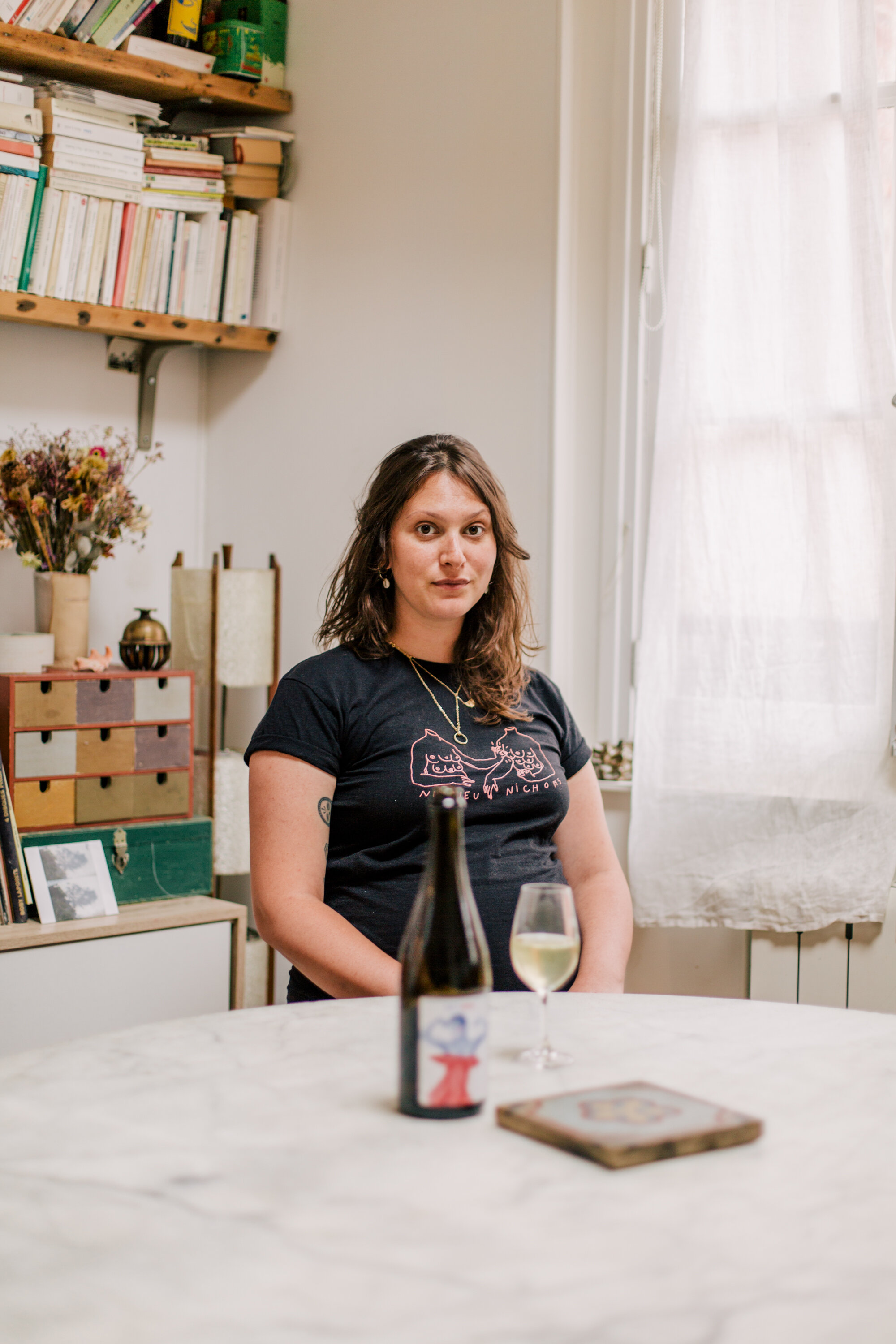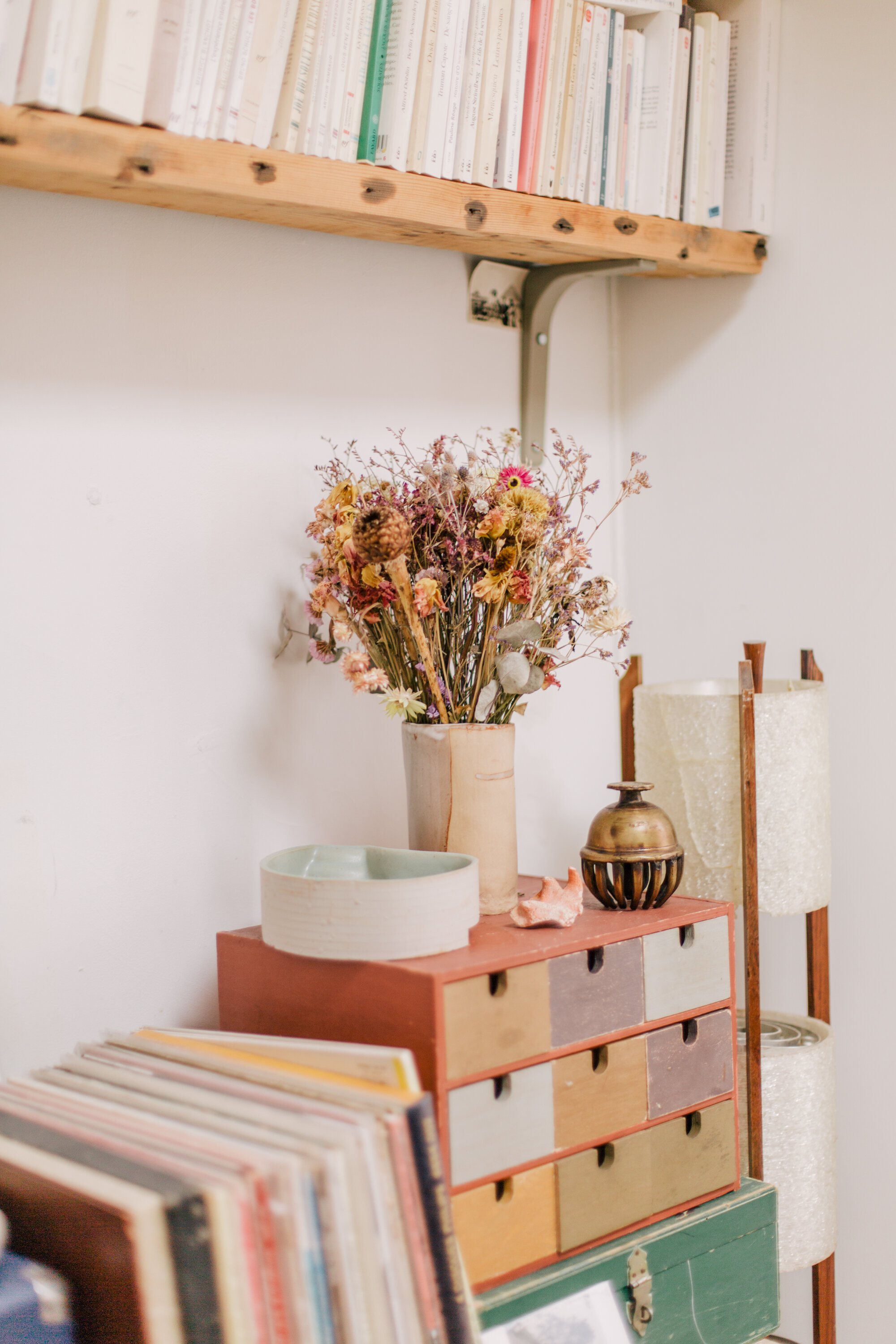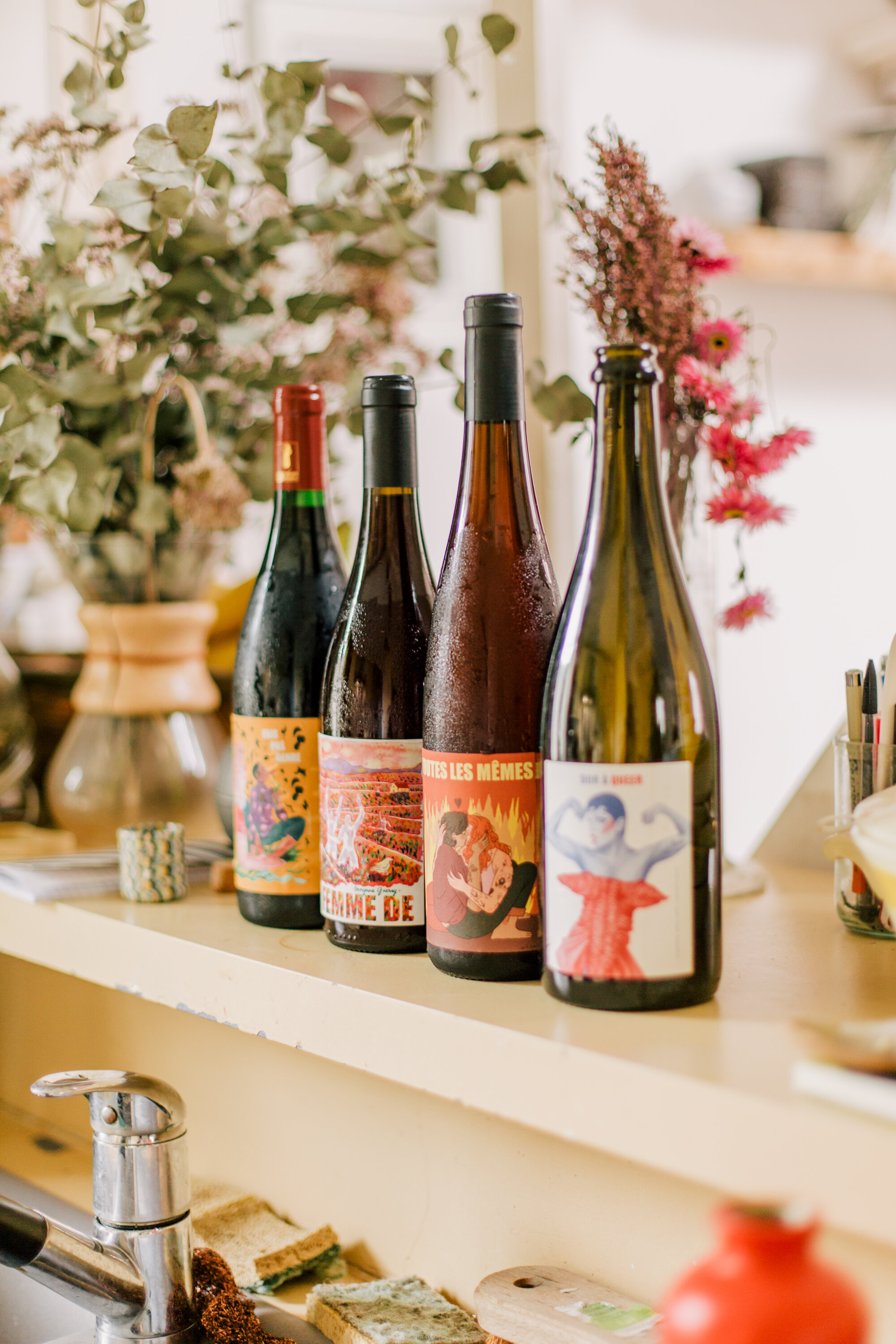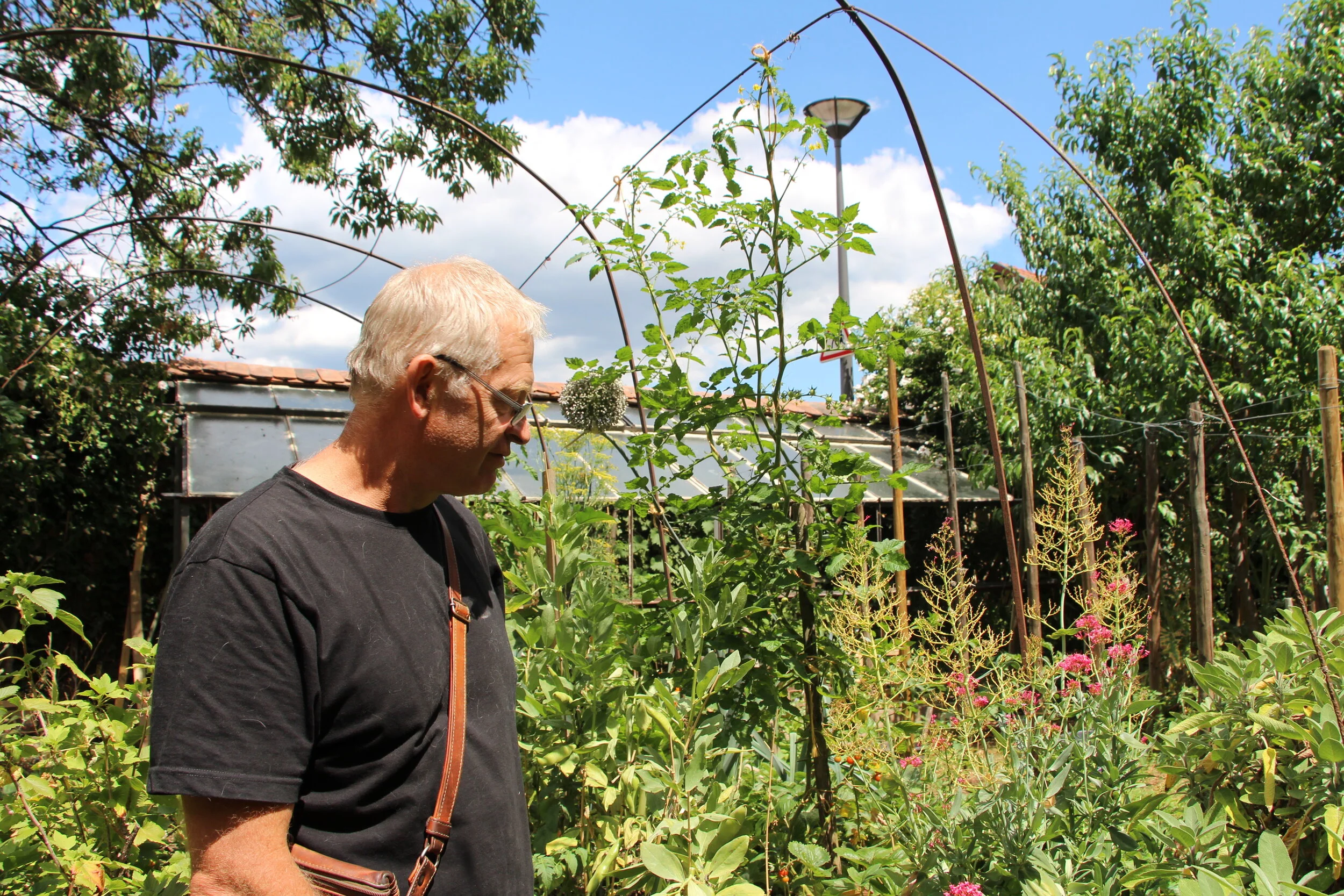Witches, Feminism and Male Tears — A Conversation with Fleur Godart and Louise Los of Vins & Volailles
The cuvées militantes—or militant wines—almost happened by accident, a knee-jerk reaction to an unpleasant, misogynistic incident experienced by Fleur Godart, founder of Vin & Volailles, and her business partner Louise Los. The two women behind the Paris-based company, a purveyor of natural wine and poultry (the company name, Vin & Volailles, literally translates as Wine & Poultry) are playing an important role in changing the narrative around wine.
Photography by Tiphaine Caro
The first of the cuvées militantes, a wine called Putes Feministes (Feminist Whores), first saw the light of day in 2020 before quickly developing into a whole series of wines that campaign for gender-related issues. The concept is simple but effective: Vin & Volailles works with winemakers and illustrators to create wines that carry powerful messages thanks to their colourful, impactful labels and thought-provoking names. Besides Putes Feministes others include: Sorcières (Witches), Male Tears, and Dur à Queer (Hard Queer to Crack).
Vins & Volailles doesn't make money off these wines. Instead, for each bottle sold the company donates 7% to a cause linked to the theme addressed by the respective wine. The money from Putes Feministes, for example, goes to Acceptess-T, a Paris-based not-for-profit organisation that supports the transgender community.
On a rainy summer's day, Fleur and Louise welcome me to the Vin & Volailles headquarters located on the outskirts of Paris. While I'm there, they gather together the 13 wines now included in the cuvées militantes on the table in front of us. It's the first time all the wines have been lined up since the latest arrivals to the series and—for them, like me—it sparks emotion to see this vibrant, powerful body of work.
***
Ginger Rose Clark: Let's go back to a time before Vins & Volailles. What was your first encounter with natural wine?
Fleur Godart: While I was at theatre school, I would help my father sell his poultry at the market. One day, someone offered me a glass of wine. At the time I was in a mind-frame of class determinism that meant I felt I wasn't concerned by wine: I was neither authorised to taste it, nor to have an opinion on what I was tasting. But that glass of wine told me a story because I wasn't expecting anything of it.
While carrying on with my work, talking to customers I would take a sip and realise that the wine had evolved: where it had previously been exotic fruits and subtle coconut and pineapple, now it was a sublime oriental garden with roses and jasmine. Even if I didn't know anything about wine, it was very obvious to me how the wine was unfolding. It made me realise that wine was a medium and that if I was that moved by it, I could also find a way to make those emotions accessible to other people.
Louise Los: My [first] encounter with natural wine took place when I was training in a kitchen. After each service, the sommelier would offer us all something to drink. Once, I put my nose in my glass and was struck by the fact it smelt of apricots. It took me right back to visiting the markets of Provence when I was little and I realised to what extent the journey was immediate. It really struck a chord with my olfactive sensitivity, something which I've had since I was little. I have memories of cooking with my mother, who taught me to count using cinnamon sticks—it's a very primal relationship to smell and that wine offered me a super joyous, poignant journey because it touched on things from my childhood.
GRC: How did Vins & Volailles come about?
FG: I set up the company in 2014, after having spent 10 years in the wine industry working in wine bars, wine shops, restaurants and also in wholesale. It had got to a stage where I realised that I needed to be working with an informed clientele, with people who were hungry for wines which are too specific and too precious for all and sundry.
I therefore decided to set up Vins & Volailles thanks to a woman I had met at the previous company I worked for. She was the first person, the first woman to consider me as an ally. She had already set up her own company and was in the process of building a wine portfolio to distribute in New York. I can remember that moment of shock when I realised that she was doing it alone because she wanted to and that she hadn't waited to be validated by anyone.
The process of sourcing wines with her made me realise that when two women talk to a winemaker, be they male or female, it cancels out any false ideas of seduction or domination. That really allowed us to put the focus on the wine, the very thing we had come to the vineyard for.
GRC: Louise, how did you come to join the company?
LL: Like Fleur, I started out in theatre before working in food. As I mentioned, the restaurant I trained at opened my eyes to natural wine so, after a work accident in a professional kitchen, it was a logical choice for me to move into wine. I retrained to be a wine merchant and it was in that capacity that I really got to know Fleur. She would come to the shop to sell wines, she would tell me great stories and it really appealed to me. I joined her in 2019.
Where did the idea for the militant cuvées come from?
FG: We were both at a magazine launch last year and a man started to speak about the editor—a woman—in a manner that was completely inappropriate. I tried to suggest that, since we are so lucky to have such a rich language, perhaps he could use terms that wouldn't offend anyone. He was drunk and because Louise and I were both confronting him, he left saying: “One can't say anything anymore. Anyway, you're nothing but feminist whores.” We felt like we'd ruined the party.
The next day, while analysing the situation over tripe and chips in Belleville, we realised that there was a real problem and that we had had the right attitude. The only thing that mattered [to us] in that moment was to reappropriate the feminist insult and do something fun with it it. Coincidentally, Julien Albertus, a winemaker, then called me to tell me he had 850 bottles he didn't know what to do with and whether we had any ideas. That's how the first cuvée, Putes Feministes, came about.
““The only thing that mattered in that moment was to reappropriate the feminist insult and do something fun with it it.””
It all worked really well together, also because the wine also tells a story. Gewürztraminer and Muscat are two grape varieties that are a bit vulgar in the way they are traditionally vinified but here, the maceration offers a touch of bitterness, confidence and some bass in all the aromatic frilliness: suddenly you’ve got a couple of free whores who have something to say.
GRC: The militant cuvées now count 12 or 13 wines. How did the rest come about?
LL: Each wine really happens in a spontaneous manner. We might be struck by current events or things that affect the people around us. Our aim is to give visibility to people who don't necessarily have it and we're not necessarily in a legitimate position to talk about everything—after all, we're white women. It's important to let others have a voice.
FG: We organise meetings with people affected by the themes we want to explore. We really try not to speak on behalf of people, but to gather testimonies, experiences, things said to people stigmatised for their differences to then create taglines or names that are easily understandable. Then we find the illustrator—until now we've only worked with cis or trans women.
LL: Depending on the theme, we then approach various winemakers and see who is the most interested, the most touched, the most moved by the concept… It varies though. On other occasions, winemakers have approached us with a wine and asked us what we wanted to do with it.
GRC: What’s been the most challenging aspect?
FG: The most difficult part is finding the wine and the winemakers. As it turns out, they're often not in the frame of mind that we thought they were. Take, for example, people who I'd had very good relations with in the past and that I hadn't seen for two years because of the pandemic. I've evolved a lot in those two years: to survive, I listened to a lot of podcasts and, as a result, the manner in which I position myself in the world has changed. When I met some of these winemakers again, I expected that they'd be happy to do a cuvée militante. Instead, they told me that natural wine is a battle in itself, or that using this grape variety or that grape variety is already an enormous commitment. To me, that's just not enough.
Whereas others, people who I thought were really stuck in old-fashioned notions of virility, are, in actual fact, super happy to be involved. Dur à Queer comes from a winemaker who looks like GI Joe, he's built like he's in the army… and he was really happy to have this interrogation on appearance and the beauty of gender on his bottles. It really moved him. So it's really a thrilling moment, where we don't always know where we're headed but we always end up finding the solution.
GRC: Why create wine names and labels that carry such an important message?
FG: Because of motherhood. I have two small children: I don't have time to go to demonstrations or to go out putting posters up in the street at night [Fleur is specifically referring to the Les Colleuses movement which saw activists postering the streets earlier this year to highlight violence against women—ed.] It frustrates me because those are moments in which you take action, in which you protest but also in which you share and offer solutions. I felt like I was excluded from those spaces of action and that in my medium, wine, nothing much was going on.
With Putes Feministes we've proved that, actually, it's easy to take action and that it produces a lot of joy. It's allowed us to meet a network of sex workers, for example. I could never have imagined meeting individuals who are so lively, so powerful in their thoughts and their actions. I'm really happy with the possibilities our militant wines offer for exchange and new encounters.
LL: To start off, it made us laugh to imagine a sommelier giving a wine list to a powerful man seated at a restaurant table and that man's uncomfortable, quizzical expression when he opens the page on Putes Feministes or Male Tears. As we thought about it, we realised that there was enough space for it to open up a debate and new forms of interrogation: these wines are both provocative and joy-inducing.
We never expected there to be so much interest for the militant cuvées, which proves that there was obviously a strong desire for a debate around these kinds of questions.
FG: Especially abroad. It’s gone much quicker with export. People are excited by the project, even if they aren’t from countries which are immersed in wine culture. I think the distance allows them to be more curious and gives them the freedom to explore avenues, compared to in France where wine shops often think twice before stocking our wines.
““Men need to understand that change is for their benefit too. It’s not easy to make men understand that patriarchy is a very sad thing.””
GRC: On that note, how do you think attitudes in France compare to in other countries?
FG : I was speaking with Nathan from Rerenga wines about the differences with the US. First of all, the US has a Protestant outlook which has resulted in things like the FDA [Food and Drug Administration]. While the FDA doesn't allow for labels like Putes Feministes, it also doesn't allow for sexist labels like those of [highly sought-after Jura producer Jean-François] Ganevat. So I'd say there's less outright sexism.
But there's also the case of different morals and boundaries. Some people here are shocked that I've adopted ideologies from the States, like postcolonial or feminist ideologies. You just need to look at #MeToo. Almost exactly at the same time as Weinstein was being taken to court in the US, Polanksi was being celebrated at Cannes. There's obviously quite a gap. In France, people are very attached to this notion of so-called French seduction.
GRC: You've both been in the wine and food industries for some time. Has it changed at all?
FG: There's still this sense of one small step forward and then a huge step back. Nonetheless, there have been some symbolic victories. The court case against Marc Sibard, a leading figure of natural wine, is a good example. It was impossible to criticise him, yet everyone knew that he was a predator.
It was really hard to prove Sibard guilty and he got off with a very light sentence, leaving his victims with no sense of justice. Nonetheless, the fact that they did find him guilty caused people to change their attitudes. I witnessed it myself with wine sellers who had previously been a bit borderline in their behaviour. Symbolically, that verdict, however lightweight, showed people that that kind of behaviour is unacceptable.
GRC: You yourself have been subject to a fair amount of sexism…
FG: I'm lucky enough to have a personal enemy, who wrote an article for his blog saying that wine, an object that once stood for sharing and conviviality, has become an object of disagreement because of me... He must literally be the only person to think that.
And then, of course, there was the whole [noted French wine critics] Bettane and Desseauve case: the magazine En Magnum published a caricature of a woman, a whore selling wine under the name Fine Wines and Roast Chicken. People we knew were struck by the many similarities between that caricature and us. We took them to court, of course.
GRC: While the judge recognised that the caricature was sexist, you didn't win the case. Doesn't that prove that there's obviously still a lot of work to be done to eradicate misogyny from the wine industry? What are your thoughts on the situation?
LL: These are social issues that affect us all, they aren't isolated issues that only happen in the world of wine. It's just that we've chosen our favourite medium, wine, to reach others with our message. The day that men come to understand that sexism isn't just a woman's matter and realise that it's not a subject that opposes men and women, we'll all be a lot happier. We need to extract ourselves from this binary system: it imprisons us. The more we accept differences, the more joy it produces.
FG: Men need to understand that change is for their benefit too. It's not easy to make men understand that patriarchy is a very sad thing.
GRC: What are your ambitions for the militant cuvées?
FG: There is a massive lack of diversity in food and wine. It's difficult for us to find a way to do anti-racist wines because there are so few non-white winemakers. It would be amazing to give that space to a winemaker who is impacted by that form of discrimination.
GRC: To end on a slightly lighter note, in honour of your company name, what's your favourite wine-poultry pairing?
LL: I'd pair guinea fowl liver—at a time of year where livers are nice and fatty, so around Christmas—with a maceration like Male Tears or Sorcières.
FG: Our poultry customers prefer white meat, so I always end up with a lot of chicken thighs—apparently people don't know that they are the best bit of a bird. You put them in the oven to roast, skin-side up surrounded by some vegetables and garlic cloves. After half an hour, when the skin is nice and crispy, you deglaze the pan with a splash of dessert wine and serve the dish with that same wine. For example, Jeannette by Damien Bureau is very, very good proof that you can make dessert wines without sulfites: it's magnificent, complex and very fine. You can't go wrong with that pairing.











